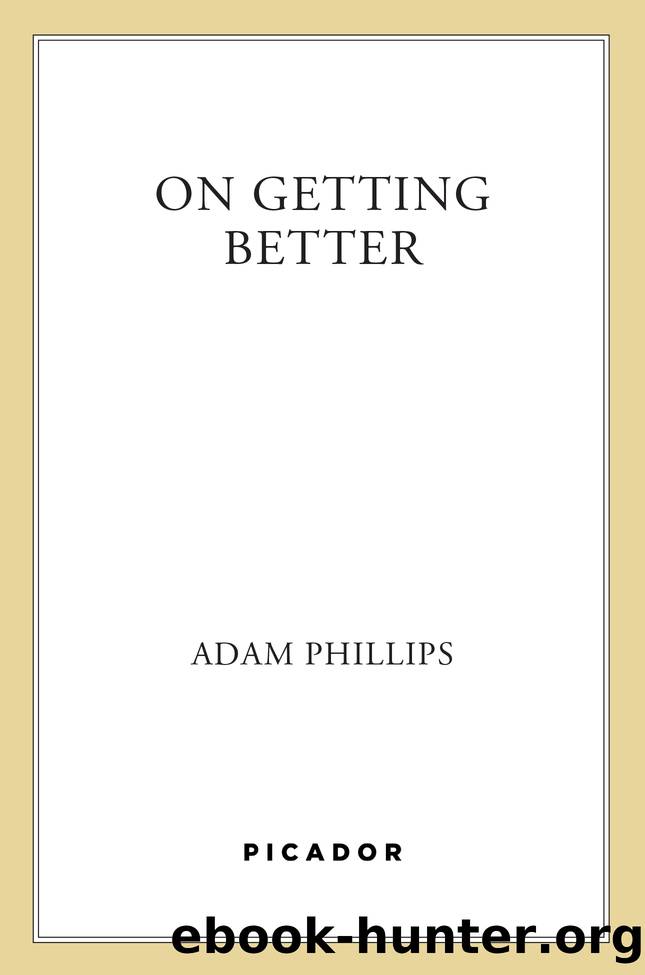On Getting Better by Adam Phillips

Author:Adam Phillips
Language: eng
Format: epub
Publisher: Picador
Once again it is a question of what psychoanalysis is built on. For Forrester, convincingly I think, the foundation of psychoanalysis involves discarding the idea that âthere exists a criterion by which one can distinguish the words [of the patient] as truth or fictionâ; but, as he pointedly adds, without being tempted to despair, the despair here of being without foundations, without available criteria to make what have seemed to be the necessary distinctions (Freudâs women of elemental passion could be described, at least from the psychoanalystâs point of view, as being unable to tell the difference between wish and reality, between truth and fiction invested with affect). The foundation, that is to say â what psychoanalysis is built on â is an absence, a suspension of the capacity to distinguish between truth and fiction (there is no criterion available to Freud to tell the crucial difference between truth and fiction; perhaps fiction invested with affect is a truth, or a version of truth, worth having, one that psychoanalysis takes seriously). And once again we should notice that it is assumed that we know, or think we can recognize, two discrete phenomena, truth and fiction, and that we can tell the difference between them, but in psychoanalysis, at least, we may not need to, or be able to. Or that our criteria for telling them apart may lead us in the wrong direction. Forrester here could be described as helping Freud discard the idea of truth (or of foundational criteria). As though truth, or some notion of truth, or some criterion that distinguishes truth from fiction, distorts or disrupts or interferes with something essential about psychoanalysis. That psychoanalysis is the practice that needs to do without our being able to distinguish truth from fiction. That once, say, you start trying to work out whether fantasies or desires or feelings are true, you lose too much (the quest for evidence displaces the feelings that are felt, in all their indeterminateness, or inarticulacy, or wishfulness); that so-called methods for the pursuit of truth can be strangely impoverishing, as though the pursuit of truth â of something called truth in religion, or philosophy, or science â could be merely a form of over-simplification; as though truth as an object of desire is akin to what psychoanalysis describes as a sexual perversion or a fetish, construed to narrow the mind and coerce feeling. In Freudâs proposal, âThere are no indications of reality in the unconscious, so that it was impossible to distinguish between truth and fiction invested with affect,â he keeps alive the idea of there being truth in the unconscious, while telling us that it is impossible to recognize it. There is truth in the unconscious, but not for us.
If Freud was a pragmatist, which he was not, we could imagine that he was saying here: if you drop the distinction between fantasy and reality, or the distinction between fiction and truth, where does it get you? What can you do without those
Download
This site does not store any files on its server. We only index and link to content provided by other sites. Please contact the content providers to delete copyright contents if any and email us, we'll remove relevant links or contents immediately.
Zero to IPO: Over $1 Trillion of Actionable Advice from the World's Most Successful Entrepreneurs by Frederic Kerrest(4568)
Machine Learning at Scale with H2O by Gregory Keys | David Whiting(4313)
Never by Ken Follett(3956)
Harry Potter and the Goblet Of Fire by J.K. Rowling(3857)
Ogilvy on Advertising by David Ogilvy(3622)
Shadow of Night by Deborah Harkness(3368)
The Man Who Died Twice by Richard Osman(3078)
Book of Life by Deborah Harkness(2939)
The Tipping Point by Malcolm Gladwell(2921)
Will by Will Smith(2919)
Purple Hibiscus by Chimamanda Ngozi Adichie(2853)
0041152001443424520 .pdf by Unknown(2845)
My Brilliant Friend by Elena Ferrante(2831)
How Proust Can Change Your Life by Alain De Botton(2814)
How to Pay Zero Taxes, 2018 by Jeff A. Schnepper(2655)
Hooked: A Dark, Contemporary Romance (Never After Series) by Emily McIntire(2554)
Rationality by Steven Pinker(2363)
Can't Hurt Me: Master Your Mind and Defy the Odds - Clean Edition by David Goggins(2341)
Borders by unknow(2313)
